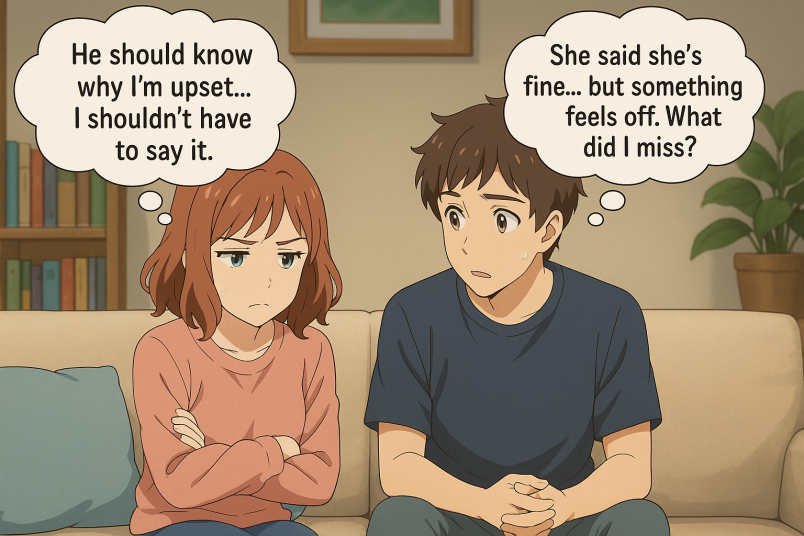What Is Indirect Communication & How Does It Affect Relationships

Heal & Grow Daily for a Happier Relationship
Subscribe FREEKey Takeaways
Marriage.com AI Quick Summary
Have you ever found yourself saying, “I’m fine,” when you weren’t, or hoping your partner would just know what you meant without spelling it out?
Sometimes, it feels easier to drop hints than to have a tough conversation. Yet those little silences, jokes, or vague replies can quietly build walls between two people. Communication isn’t just about words; it’s about the feelings underneath them, the tone, and the courage to be honest.
Indirect communication often comes from care or fear; it’s a way to protect hearts, but it can also leave them guessing. When messages get lost between what’s said and what’s truly felt, even love can feel a little uncertain.
What is indirect communication?
Indirect communication is a way of communicating wherein a person chooses to act out what they really mean instead of saying it directly. A person can say something and mean entirely different things by using tone of voice, gestures, and facial reactions.
But why do people opt to convey their message through indirect communication when it is definitely easier to just say it upfront?
The reason for this is that these people don’t want to be directly rejected, want to avoid arguments, be on the “safe” side, and ultimately save face.
Unless you are used to this type of communication style, indirect communication is hard to understand, let alone base your decisions on these hints.
Dr. Jennifer Schulz, PhD in Psychology, says,
Indirect communication may feel safer, but ultimately, it harms relationships.
Indirect communication can greatly affect relationships, not just with the people you talk to but also with your work, friends, family, and partner.
-
What are some examples of indirect communication?
You may not be aware of it, but indirect communication examples in relationships are more common than you think. Examples of these indirect communications in relationships include:
- Saying the magic words “I love you” is always special, so when your partner or spouse says this in a very flat tone, what would you feel? What this person says is definitely not the same as what his body and actions show.
- When a woman asks if the dress she’s wearing looks good on her or if she looks stunning, then her partner might say “yes,” but what if he’s not looking directly into the woman’s eyes? The sincerity isn’t there.
- When a couple has a misunderstanding and wants to talk to each other to fix it, a verbal agreement is not enough. You should also see how your partner reacts to what you say.
It’s understandable to want to stay in a safe zone when you’re in any type of relationship. However, it can be a bit scary to tell what you feel upfront, especially when you fear that the other person will not be able to take it well.
But as they say, we may not speak what we really want to say, but our actions will give us away, and that’s the truth.
7 ways indirect communication affects relationships
Sometimes, people don’t realize how much unspoken words shape the emotional tone of a relationship. It’s not always about what’s said out loud but what’s hinted at, avoided, or left hanging in the air.
While it may seem harmless or even polite at first, choosing to communicate indirectly can quietly influence how two people connect, trust, and understand each other. Here are seven ways it can affect relationships over time.
1. It creates misunderstandings
When someone relies on hints instead of honesty, the other person might misinterpret the meaning or tone. This can lead to small misunderstandings that grow into frustration or distance. Even with good intentions, unclear communication leaves room for assumptions.
A study of 400 participants found that fewer misunderstandings and open communication increase relational satisfaction. Romantic partners viewed misunderstandings as more serious than friends did, and mediated misunderstandings occurred more often than those that happened face-to-face.
And once assumptions start, clarity fades quickly. Over time, both partners may begin to feel unheard or misunderstood, even when they’re trying their best to connect.
Here’s how it might appear in your relationship:
- Saying “It’s fine” when you’re clearly upset.
- Expecting your partner to pick up on your tone instead of your words.
- Feeling frustrated that they didn’t “read your mind.”
2. Emotional needs go unmet
When you don’t say what you truly feel, your partner can’t meet needs they don’t know exist. You might hope they’ll notice the signs or “just get it,” but they often won’t.
This can lead to quiet resentment or disappointment that builds up over time. Being open about what you need takes courage, but it also allows your partner to show up for you in the way you really want.
Here’s how it might appear in your relationship:
- Feeling hurt that your partner doesn’t comfort you when you’re sad.
- Dropping hints about wanting help but never asking directly.
- Believing they “should already know” what you need.
3. It increases emotional distance
Indirect communication can make emotional closeness harder to maintain. When people tiptoe around feelings, it creates invisible barriers that slowly widen the gap between them. A relationship thrives on honesty and vulnerability, not guessing games.
When neither person feels safe to speak openly, connection turns into polite conversation instead of deep understanding. It’s not always intentional, but the distance becomes real.
Here’s how it might appear in your relationship:
- Avoiding serious topics because you “don’t want drama.”
- Talking about everything except what’s really bothering you.
- Feeling close on the surface but emotionally disconnected inside.
4. Small conflicts get bigger
Avoiding direct conversations can make small problems grow quietly until they feel overwhelming. When you keep feelings inside or express them through sarcasm or withdrawal, your partner can’t fix what they don’t understand.
The silence might feel peaceful at first… until it turns into tension that neither knows how to solve. Addressing issues early—with kindness and honesty—keeps things from turning into emotional storms later.
Here’s how it might appear in your relationship:
- Pretending nothing’s wrong after a disagreement.
- Making a joke instead of admitting you’re hurt.
- Snapping over something small because old feelings piled up.
5. It can lower trust
When one person starts noticing patterns of avoidance or unclear messages, they may begin to question what’s real. Trust isn’t only about fidelity; it’s also about emotional transparency.
If you’re not sure what your partner truly thinks or feels, it’s hard to feel grounded in the relationship. Clarity builds confidence, but vagueness creates doubt—and doubt, over time, can quietly erode love’s foundation.
Here’s how it might appear in your relationship:
- Feeling unsure if your partner means what they say.
- Questioning why they won’t talk about what’s bothering them.
- Holding back your own truth because honesty feels one-sided.
6. It leads to unspoken resentment
Holding back feelings might seem like a way to keep the peace, but it often does the opposite. When needs, disappointments, or frustrations aren’t voiced, they don’t disappear; they linger.
Research found that anger in romantic relationships can spread between partners through daily interactions. When one partner feels angry, they may act destructively, prompting anger in the other. This cycle reinforces itself over time. Agreeableness moderated these effects, while relationship commitment did not.
Over time, those unspoken emotions can show up as irritability, emotional withdrawal, or even passive-aggressive behavior. The longer they stay bottled up, the harder it becomes to repair what’s left unaddressed.
Here’s how it might appear in your relationship:
- Giving the silent treatment instead of expressing frustration.
- Feeling annoyed by your partner’s habits but never mentioning them.
- Acting distant without really knowing why.
7. It prevents emotional growth
Healthy relationships thrive when both people can express themselves honestly and feel heard. When communication stays indirect, personal and emotional growth slows down. Each person misses the chance to practice empathy, assertiveness, and deeper understanding.
It’s in those honest, sometimes uncomfortable talks that relationships truly evolve. Speaking openly may feel scary at first, but it’s where real connection—and real love—begins.
Here’s how it might appear in your relationship:
- Avoiding deep talks because they feel “too heavy.”
- Realizing you keep repeating the same patterns in arguments.
- Feeling stuck instead of growing closer together.
Direct vs indirect communication: What is the difference?
Now that we are familiar with the definition of indirect communication, let’s see the difference between direct and indirect communication and how it can affect relationships, whether professional, family, or marital.
Direct communication is when you are not afraid of saying what you want to say.
It’s not tactless; instead, it’s when they value honesty over sugarcoating their real feelings. Whether in work relationships or with their families and spouses, these people know what to say and when to say it, giving both parties the opportunity to settle their differences and improve.
Indirect communication is the opposite of direct communication.
Here, the person would rather save the relationship than face arguments and misunderstandings. They may or may not know it, but their speech and actions are totally different.
This may seem like a peaceful way of dealing with other people, but no problem is being addressed here.
Your issue today will still exist as long as you are not brave enough to talk directly to the person, but how do you do it without sounding aggressive?
| Aspect | Direct communication | Indirect communication |
|---|---|---|
| Definition | Openly expressing thoughts, feelings, and opinions in a clear and straightforward way. | Hinting, implying, or using gestures and tone to express feelings without stating them directly. |
| Intent | To be honest and clear, even if it means addressing uncomfortable topics. | To avoid conflict, maintain harmony, or protect someone’s feelings. |
| Tone and style | Calm, respectful, and assertive; focuses on clarity and mutual understanding. | Polite or cautious; may rely on body language, tone, or subtle cues. |
| Impact on relationships | Builds trust, promotes problem-solving, and strengthens emotional connection. | Creates confusion, delays resolution, and can lead to unspoken resentment. |
| Common traits | Confidence, honesty, emotional maturity, and openness to feedback. | Avoidance, fear of rejection, sensitivity to others’ emotions, and hesitation to speak up. |
| Example scenario | Saying, “I felt hurt when you canceled our plans without telling me.” | Saying, “It’s fine,” while clearly feeling disappointed or upset. |
How to recognize and address indirect communication: 5 tips
Recognizing indirect communication takes awareness, patience, and a bit of self-reflection. It’s not always easy to admit when you’re holding back or relying on hints instead of words.
But learning to notice these patterns, and gently shifting them, can bring more honesty, understanding, and peace into your relationship. Here are 5 ways to start.
1. Notice when you avoid being direct
Pay attention to moments when you hold back from saying what you truly feel. Maybe you soften your words too much, or use humor to hide hurt feelings.
These small habits often signal fear of conflict or rejection. Awareness is the first step toward clearer, more confident communication.
- Do this: Take a breath before responding, and ask yourself if you’re being fully clear. Speak your truth kindly, even if it feels a little uncomfortable.
2. Reflect on what you’re really feeling
Sometimes we speak indirectly because we’re unsure of our emotions. Take a moment to sit with your feelings before responding.
Ask yourself, “What am I really trying to say?”
The more honest you are with yourself, the easier it becomes to be honest with someone else.
- Do this: Write down what you feel before sharing it. Seeing your emotions in words helps you organize your thoughts and express them with more clarity and care.
3. Practice saying things simply
You don’t have to give long explanations or perfect words, just be clear. Try expressing one thought or feeling at a time, calmly and kindly.
The more you practice saying things directly, the more natural it will feel. Simplicity often builds trust faster than carefully hidden meaning.
- Do this: Use short, gentle statements like “I felt hurt when…” or “I need some time to think.” Simple honesty often creates more understanding than complicated words.
4. Ask your partner for clarity
If you sense mixed messages, ask gentle questions instead of making assumptions.
A simple “Can you tell me what you meant by that?” can open the door to deeper understanding.
Approaching with curiosity, not blame, helps both of you feel safe and respected during tough talks.
- Do this: Listen without interrupting, and paraphrase what you heard to confirm understanding. This small step shows care and helps prevent confusion or unnecessary tension.
Watch this TED Talk as Dr. Joanne Davila shares three science-based skills: insight, mutuality, and emotion regulation to help you build healthy, lasting, and balanced romantic relationships:
5. Create a safe space for honesty
Open communication grows in an environment of trust and empathy. Show your partner that it’s okay to share difficult feelings without judgment.
Listen, stay calm, and validate their experience. When honesty feels safe, both of you will feel freer to express yourselves without hiding behind silence or hints.
- Do this: Respond gently even when feedback is hard to hear. Gratitude for honesty, not defensiveness, encourages more open conversations and emotional closeness.
Building clarity and emotional safety
Relationships thrive on honesty, patience, and the willingness to truly listen. Indirect communication might feel safer at times, but it often hides what the heart really wants to say. Learning to speak clearly, even when it’s uncomfortable, can bring surprising relief and closeness.
It’s not about perfection, but about showing up with sincerity and care. When both people choose truth over guessing, conversations become warmer, easier, and more meaningful.
So take that small step toward openness today… because every honest word, spoken with love, can strengthen the bond you share.
Want a healthier, happier relationship - one step at a time?
 Tips
Tips
Write your tip or submit a video tip
All tips are reviewed before the publishing.
Share this article on
Recent Articles
Related Quizzes
Heal & Grow Daily for a Happier, Healthier Relationship
Subscribe FREE on YouTube We'd love your feedback!
We'd love your feedback!
 Expert Q&A
Expert Q&A
Ask your question related to this topic & get the support you deserve from experts.





















 Thanks for your feedback!
Thanks for your feedback!